-
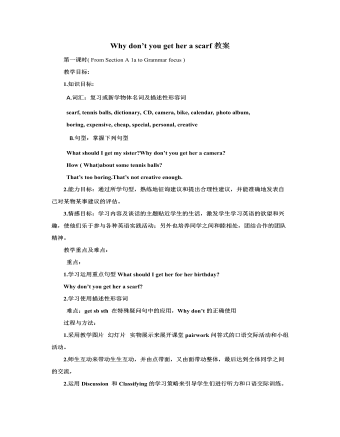
人教版新目标初中英语八年级下册Why don’t you get her a scarf教案
教师带领学生复习有关描述宠物的词汇,采用教师提问学生回答的方进行。如:T:What animals do you think would be good pets?What animals do you think would be bad pets?What do you think are good animals for a six-year-old child?然后学生进行 pairwork 练习。Task two: 师生互动,学习探究 1、播放3a部分的录音,引导学生一边听录音,一边跟读。2、通过听录音学生回答以下问题:Why do you think pot-bellied pigs are popular?What are the advantages and disadvantages of keeping such a pet?教师对学生的回答进行及时点评。3.学习范文,学习重点短语,为下步的模仿写作提供语言素材。T :1. )Have you ever kept a pig as a pet?Do you like pigs? St.:No.…Why don’t you like to keep a pig? St: No.They’re too dirty and lazy(Do you know in some foreign countries like Hollyland, Australia,pigs are the most popular pet.there’s a kind of pig.(图)it has an interesting name? it ‘s called a pot-bellied pig.) Now,let’s learn an article about this kind of interesting pet.2.)play the tapeSt.:Listen and repeat3.)show some Qs on computer(本子St.: read silently,then answerthe Qs(本子)4.)Ask ss. Close book and retell this passage.(what is a pot-bellied pig? Is it a good or bad pet? ) St.: retell it to each other“A pot –bellied pig is a popular pet now…”5.read the article together.St.:.practice reading

人教版新目标初中英语九年级下册By the time I got outside, the bus had already left教案
Ⅰ. Teaching Aims and Demands1. Knowledge Objects(1) Key Vocabularyoversleep(2) Target LanguageWhat happened?I overslept. And by the time I got up, my brother had already gotten in the shower.2. Ability Objects(1) Teach the students to use the new words.(2) Train the students to narrate past events with the Past Perfect Tense.(3) Train the students' listening and speaking skills with the target language.3. Moral ObjectIt’s a good habit to go to bed early in the evening and get up early in the morning. So you’ll never be in a hurry in the morning.Ⅱ. Teaching Key Points1. Key Vocabularyoversleep2. Target LanguageNarrate past events with the Past Perfect TenseⅢ. Teaching Difficult Points1. Train the students to narrate past events with the Past Perfect Tense.2. Train the students to understand the target language in spoken conversation.Ⅳ. Teaching Methods1. Thinking of examples from the students' real lives.2. Making sentences by looking at the pictures.Ⅴ. Teaching AidA tape recorderⅥ. Teaching ProceduresStep I Revision1. Revise the language points in Unit 8.Ask some questions like this: What volunteer work would you like to do?Help the students to answer, I’d like to…/I love to…/I hope to2. Practice the dialogue in Activity 3c on page 62 again. Get students to role play the similar dialogues with the following.

人教版新目标初中英语九年级下册You’re supposed to shake hands教案
教学目标:1. 掌握本单元一些重点词汇的写法和用法。2. 学会自如谈论餐桌礼仪。Step 1 RevisionAsk some students to retell the customs at the table in France in the passage in 3a.Step 2 Self checkPart 1. Fill in each bland with the correct word given. Students do the exercises by themselves at first. Then check the answers. Ask the students to comprehend the sentences and help them point out uses of some words, like “arrive (at / in) sw., spend time / money on sth , spend time / money (in) doing sth.”Part 2. Read about Fan Ling’s experience in a western restaurant. Understand the passage. Point out some key points in the passage.1. be / get used to doing sth. 习惯做某事2. begin with = start with 以….开头3. crowd v. 挤满,塞满 the crowd 人群 crowded adj. 拥挤的Then students discuss about how she would solve her problem. Ask some to share their stories with others.Part 3. Complete the crossword by looking at the sentences on the left. Then check the answers.
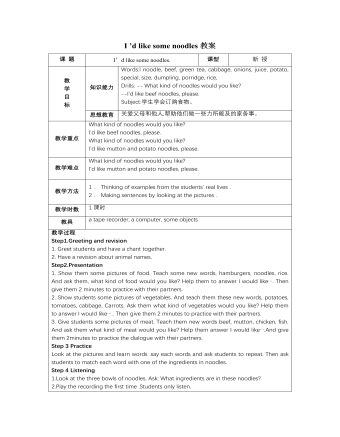
人教版新目标初中英语七年级下册I ’d like some noodles教案
教学过程Step 1: warming-up Sing a song---------“food and drink” Step 2: Revision1 Dictation2 Revise: What kind of noodles would you like?I’d like …What size bowl of noodles would you like?I’d like…Step 3: Presentation1 show pictures of food, ask students say the words.2 Students read the newspaper ad in 3a. Fill in blanks with words in the box. Then read the ad together, the teacher explains some difficult language points.3 Check the answers Step 4 PracticeAsk students to finish 3b in the same way according to 3a. Students read the short passage and fill in the blanks .At last, check the answers.Step 5 productionAsk students to write their own ad for dumplings, noodles, drinks, and other foods they know. Then ask students to read their partner’s ad. Then order food and drink from their partner.Step 6 Home workGroup work – make an ad about “food and drink”
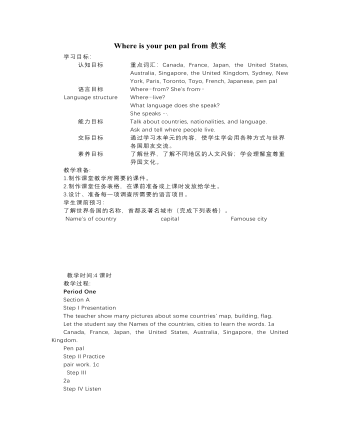
人教版新目标初中英语七年级下册Where is your pen pal from教案
2.1Match the country with the language.Step II Reading3a? let the students read the letter fast and answer the questions.? Let the students ask more questions about the letter as possible as the can.Step III Writing3b.Step IV. Pairwork2cStep V Listening2a, 2bStep V. HomeworkExercises book(1) P3Exercises book (2) P3Period FourStep I . Dictate the words and sentences in Unit1.Step II. Self-checkStep III. Check the answers for Exercises book in the unit.Step IV. Home workRevise and preparation for unit 2.教学反思:通过本单元的学习,学生基本可以谈论人们的国籍,居住城市及其所说的语言,通过书信方式去介绍自己并寻找笔友。但在涉及到国外的一些城市时,学生对这方面的知识相对欠缺,能介绍的城市并不多,也反应出学生课前预习不充分,这跟学生学习条件也有关,大多数学生无法通过网络获取所需信息。因此,在以后的教学中要多指导学生通过计算机网络获取信息,拓宽知识面。
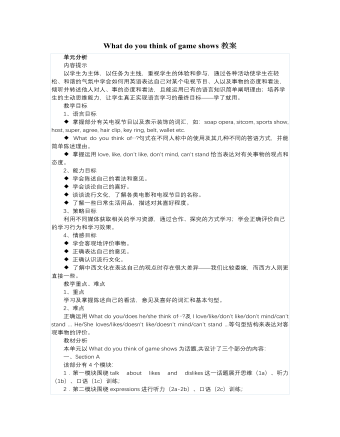
人教版新目标初中英语七年级下册What do you think of game shows教案
五、教学Section B-2c1. Pair work: What do you think of the belt/sunglasses/…? What does your father/mother/… think of your scarf/belt…?2. Group work(1). Teacher shows some different kinds of school uniforms (制服)and asks : “ What do you think of your school uniforms? If you have a chance to choose your school uniforms, what kind would you like to choose?”(2). Discuss in groups.(3).Get some Ss to report in class.说明:这一步旨在让学生运用已有的语言知识谈论对事物的看法和意见,并简单阐明理由,培养学生的主动思维能力和运用英语的能力。六、教学拓展调查电视节目的收视率任务:调查你周围的人对现在各种电视节目的反响。活动过程:1.教师布置任务,让学生调查周围的人(包括他的亲戚朋友和邻居)喜欢收看哪方面的电视节目。2.学生进行调查活动,运用本单元所学的句型What do you think of….? (Why?)What's your favorite game shows?What do you think of talk show?I doesn’t mind it.I like it.I love it.I can’t stand it.3.记录下排在前10位的TV Program,填写调查表,比较其收视率。
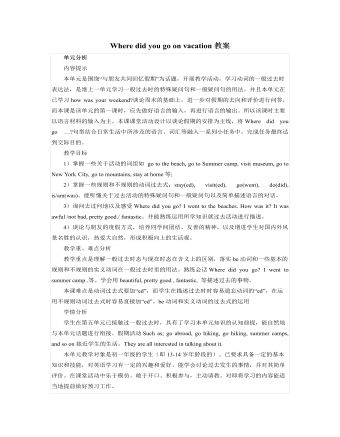
人教版新目标初中英语七年级下册Where did you go on vacation教案
句型: Where did you go on vacation? I went to summer camp.Did she go to Central Park?Yes,she did.No, she didn’t语法:一般过去时特殊疑问句、一般疑问句及肯、否定回答。课时安排4课时第一课时:Section A:la,1b,lc,2a,2b,2c 第二课时:Section A:3a,3b,4第三课时:Section B:1,2a,2b,2c第四课时:Section B:3a,3b,3c,4 and Self Check第一课时教学目标掌握描写假期生活的形容词。假期里自己所做事情的简单表达。谈论假期做的事情及当时情况。谈论假期时旅游的天气,旅游者以及食物等。教学过程一、导入播放一首英文歌曲:Let’s travel 说明:通过让学生听节奏欢快迪斯尼英语歌曲Let’s travel.引入本节课谈论的话题vacation and travel. 让歌曲使学生的思维活跃,增强课堂气氛,激发学生提高学习英语的兴趣。T:How is the trip ?Ss : It’s pretty good/ happy/exciting /relaxing/busy/dangerous/ fantastic说明:这个问题是为了操练形容词。建议让多个Ss作答。鼓励他们用不同的形容词。上述个别形容词本应在第二课时中出现,但可以在warming-up中第一次非正式出现。这些形容词也可在老师的评价语中适时出现,以加深学生对词汇的印象。
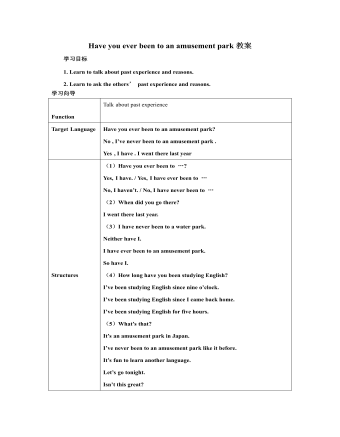
人教版新目标初中英语八年级下册Have you ever been to an amusement park教案
(1)Have you ever been to …? Yes, I have. / Yes, I have ever been to …No, I haven’t. / No, I have never been to …(2)When did you go there? I went there last year. (3)I have never been to a water park. Neither have I. I have ever been to an amusement park. So have I. (4)How long have you been studying English? I’ve been studying English since nine o’clock. I’ve been studying English since I came back home. I’ve been studying English for five hours. (5)What’s that? It’s an amusement park in Japan. I’ve never been to an amusement park like it before. It’s fun to learn another language. Let’s go tonight. Isn’t this great?space museum, amusement park, water park, South America, Peru, Holland, European culture, tour guide, flight attendant, musical instrument, more than, be from, get to, take lessons, neither, discover, graduate, change
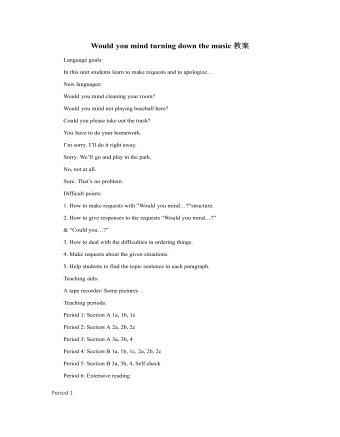
人教版新目标初中英语八年级下册Would you mind turning down the music教案
Step 4. Group work (4)1. Ask a pair of students to read the dialogue. Say, This activity provides speaking, listening and writing practice using the target language.2. Ask students to complete the work in groups.3. Check the answers with the whole class. 4. Explain some of the language points. Step 5. Word review (Self check 1)1. Ask students to read the words and the phrases given. 2. Fill in the blanks with proper forms of these words to complete the sentences. 3. Check the answers with the whole class. Homework:Do activity 2 on page 57 after class. Period 6Teaching aims: 1. Teach vocabulary words and the useful expressions. 2. Enable the students to learn etiquette in different culture. 3. Help the students learn how to behave politely in public places and in daily life. Teaching procedures:Step 1. RevisionHelp students to review the function of making requests through a free talk. Then lead them to the topic of etiquette. Explain the meaning of etiquette. Or, ask students to look it up in the dictionary. Step 2. Pre-reading (Section 1)1. Ask students to read the picture and make a list with their partner about how many rules of etiquette can be seen being broken.

人教版新目标初中英语九年级下册Rainy days make me sad教案
1. 教材分析本单元以how do things affect you?为话题, 从颜色、天气、音乐、广告、产品等方面谈论了外界事物如何影响人的心情。要求学生掌握表达某物或某事给人带来的感觉、看法或影响等。共设计了四个部分的内容:Section A 该部分有4个模块:第一模块围绕Which restaurant would you like to go to?这一话题展开思维(1a)、听力(1b)、口语(1c)训练;第二模块围绕How does music affect you? 进行听力(2a-2b)、口语训练(2c);第三模块继续围绕how do colors in the restaurant affect you这一话题展开训练,训练形式为阅读和问题体验(3a)和小组活动(3b);第四模块仍就How do things affect you这一话题以调查的形式展开讨论。Section B该部分有4个模块:第一模块围绕产品广告对人们的影响这一话题以“配对”(1a)与“列举”(1b)两种形式展开训练;第二模块继续围绕How do things affect you? 进行听力(2a-2b)、口语对话训练(2c);第三模块围绕“Advertising”这一话题展开阅读(3a-3b)和写作(3c)训练;第四模块围绕How posters affect you这一话题以口语训练形式展开小组活动。

人教版新目标初中英语九年级下册Could you please tell me where the restrooms are教案
Step Ⅰ RevisionCheck homework. Ask a few students to read the article in 3a.Then ask a few students to read their guides.Step Ⅱ Part 1Look at the words in the box. Ask a student to read them. Make sure the students understand the meaning of the words. You are to fill in the blanks with the words. In some cases, students may need to use another form of the word, for example adjusting for tense or subject/ verb agreement.Ask students to fill in the blanks on their own.Check the answers. Step ⅢPart 2Go through the instructions with the class.Look at the example with the students.Ask students what the answer would be.Ask a student to read the question and answer it.Excuse me, could you tell me where the bank is, please?The bank is across the street from the shopping malt.Get students to complete the work in pairs.Check the answers. Ask a few students to read their questions.Step Ⅳ Just for Fun!Ask all the students to read the conversation. Ask: What is funny about this cartoon? Help students to explain. A Martian is a person from the planet Mars.There is no such thing as Martian food on Earth, and the clerk looks silly because he is trying to think of where there is a Martian restaurant.Invite some pairs of students to present this conversation to the rest of the class.Step Ⅴ Summary and HomeworkIn this class, we’ve done much writing practice using the key vocabulary words and the target language presented in this unit. After class, please finish the questions in 2 in your exercise books. Then finish the exercises on pages 47~48 of the workbook as well.The Seventh Period Ⅰ Teaching Aims and Demands1. Knowledge Objects(1) Key Vocabularyimage, adventure, jealousy, hero, crime, journey, brave, no longer, show interest in, take it easy, become interested in, plain looks(2)Text:Grown-ups like cartoons, too.2. Ability Objects(1) Fast-reading to get a general idea of the text.(2) Careful-reading to get the detailed information in the text.

人教版新目标初中英语九年级下册I’ll help clean up the city parks教案
Talk about offering help (P60)I’ll help clean up the city parks.A: I’d like to work ...B: You could help ...Talk about ways to tell people about the Clean-Up Day (P61)We need to ...We can’t ...I’ll ...Talk about the work the volunteers do (P62)These three students all volunteer their time to help other people.Somebody loves to ... / helps ... / plans to ... / wants to ...A: What do you like doing?B: I like ... A: What kind of volunteer work do you think I could do?B: You could ...1. 重点词汇advertisement, fix, repair, pleasure, blind, deaf, shut, carry, specially, fetch2. 认读词汇hunger, homeless, cheer, clean-up, sign, establish, major, commitment, elementary, veterinarian, coach, similar, call-in, strategy, disabled, organization, unable, support, appreciate, donation, part of speech, pronoun, adverb, preposition, conjunction, donate, Jimmy, Sally3. 词组clean up, cheer up, give out, put off, set up, think up, take after, fix up, give away, put up, hand out, work out, at once
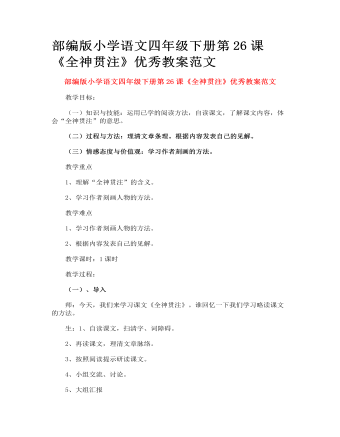
部编版小学语文四年级下册第26课《全神贯注》优秀教案范文
(一)、导入 师:今天,我们来学习课文《全神贯注》。谁回忆一下我们学习略读课文的方法。 生:1、自读课文,扫清字、词障碍。 2、再读课文,理清文章脉络。 3、按照阅读提示研读课文。 4、小组交流、讨论。 5、大组汇报 (二)、按照学习方法,进行学习。 (三)、(以小组为单位)汇报学习情况。 1、小组1:读课文,并讲解不理解的词义。 提醒易读错的字音和易写错的生字。
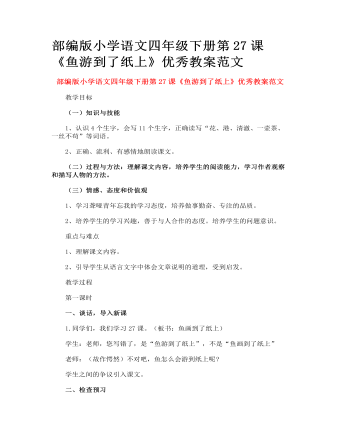
部编版小学语文四年级下册第27课《鱼游到了纸上》优秀教案范文
1.想想课文讲了一件什么事?“鱼游到了纸上”的意思是什么?(“我”去玉泉观鱼,认识了一位残疾青年,他每个星期天都来这里画金鱼。“鱼游到了纸上”意思是说这位青年画的金鱼十分形象生动,像活的那样在纸上游动。学生可以从整体感知课文内容,只要大致说出课文讲了一件什么事就行了。)2.你是怎么知道这位青年是聋哑人?找出课文中的有关语句。(“从来不说一句话”“没有任何反应”,和他胸前佩戴的“福利工厂”的厂徽,可以看出他是一位聋哑青年。如果是会说话的人,不可能从来不说一句话;如果是听得见的人,那么在众人的赞叹、议论声中,不可能“没有任何反应”;“福利工厂”一般是专为残疾人开办的工厂。)
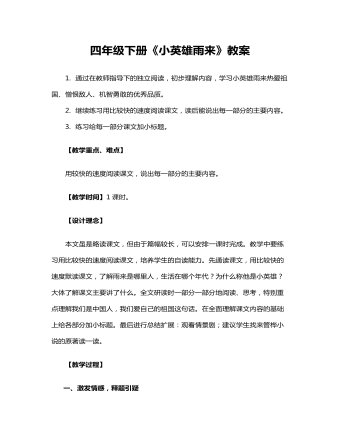
四年级下册《小英雄雨来》教案
1. 通过在教师指导下的独立阅读,初步理解内容,学习小英雄雨来热爱祖国、憎恨敌人、机智勇敢的优秀品质。2. 继续练习用比较快的速度阅读课文,读后能说出每一部分的主要内容。3. 练习给每一部分课文加小标题。【教学重点、难点】用较快的速度阅读课文,说出每一部分的主要内容。【教学时间】1课时。【设计理念】本文虽是略读课文,但由于篇幅较长,可以安排一课时完成。教学中要练习用比较快的速度阅读课文,培养学生的自读能力。先通读课文,用比较快的速度默读课文,了解雨来是哪里人,生活在哪个年代?为什么称他是小英雄?大体了解课文主要讲了什么。全文研读时一部分一部分地阅读、思考,特别重点理解我们是中国人,我们爱自己的祖国这句话。在全面理解课文内容的基础上给各部分加小标题。最后进行总结扩展:观看情景剧;建议学生找来管桦小说的原著读一读。【教学过程】一、激发情感,释题引疑1、课件演示:小雨来与鬼子斗争的片断。问:你们想认识这位小英雄吗?2、出示课题:(1) 理解课题:齐读课题你从中知道了什么?小——指的是雨来的年龄小,是一个少年。英雄——指的“是雨来的特点。雨来——课文中的主人公。课题表现出文章的中心——英雄。(2) 引导到学生质疑:看到课题后,你还想知道什么?(为什么称雨来是小英雄?)(从课文中的哪些地方可以看出雨来是一位小英雄?)

二年级语文下册教案课程全册
本文是一篇语言优美,充满儿童情趣和文学色彩的文章,仿佛呼唤着我们去寻找春天。我们到校园里找一找,也许能在操场边发现刚探出头的小草;我们到野外去找一找,也许能在天空中发现飘飘摇摇的风筝;打开课本,我们还会在课本插图中发现春天的影子;读着课文,我们会感觉自己就是那几个脱掉棉袄,冲出家门,奔向田野的孩子,我们还能体会到寻找春天的急切心情,感受到发现春天的欣喜。二年级学生具有好奇、爱探索、易受感染的心理特点,容易被新鲜的事物、活动的东西所吸引。在一年半的语文学习后,他们已经能够说一段较完整的话,并能在教师创设的情境中体验、感受,达到情感的共鸣,同时也积累了不少生活素材,这些都是学习本课的有利因素。
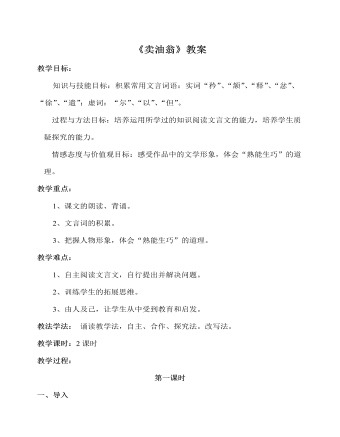
部编版语文七年级下册《卖油翁》教案
教学目标:知识与技能目标:积累常用文言词语:实词“矜”、“颔”、“释”、“忿”、“徐”、“遣”;虚词:“尔”、“以”、“但”。过程与方法目标:培养运用所学过的知识阅读文言文的能力,培养学生质疑探究的能力。情感态度与价值观目标:感受作品中的文学形象,体会“熟能生巧”的道理。教学重点:1、课文的朗读、背诵。2、文言词的积累。3、把握人物形象,体会“熟能生巧”的道理。教学难点:1、自主阅读文言文,自行提出并解决问题。2、训练学生的拓展思维。3、由人及己,让学生从中受到教育和启发。教法学法: 诵读教学法,自主、合作、探究法。改写法。教学课时:2课时

部编版语文七年级下册《台阶》教案
父亲是一个非常要强的农民,有志气,不甘人后,有长远的生活目标,有愚公移山的精神和坚韧不拔的毅力。老实厚道,诚实,不怕千辛万苦,有着中国传统农民所特有的谦卑。 作者写作本文的目的是什么?小说塑造了发展中的中国农村一个农民的典型形象。他的血管里有我们民族拼命硬干、坚忍不拔的精神,他身上所具备的优秀品质代表了新旧交替时期中国农民的突出特征。同时,这一形象还告诉我们,农民创业之所以如此艰难困苦,根源在于经济落后。亿万农民的希望在于先进的生产力,以此迅速改变农村落后面貌,结束老牛拉破车的日子。作者对父亲的优秀品质表示敬仰和赞叹;对父亲身上的中国传统农民所特有的谦卑表示同情;对改变农村的面貌寄予希望。 六、 语言理解1、 “父亲坐在绿阴里,能看见别人家高高的台阶,哪里栽着几棵柳树,柳树老是摇来晃去,却摇不散父亲那专注的目光。这时,一片片旱烟的烟雾在父亲头上飘来飘去。”这一处描写表现了父亲什么样的思想感情?为什么不用心理描写?
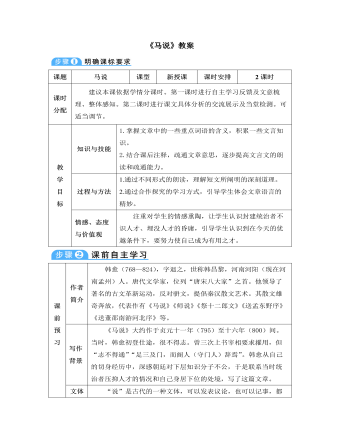
部编版语文八年级下册《马说》教案
课时分配 建议本课依据学情分课时。第一课时进行自主学习反馈及文意梳理、整体感知。第二课时进行课文具体分析的交流展示及当堂检测。可适当调节。教学目标 知识与技能 1.掌握文章中的一些重点词语的含义,积累一些文言知识。2.结合课后注释,疏通文章意思,逐步提高文言文的朗读和疏通能力。过程与方法 1.通过不同形式的朗读,理解短文所阐明的深刻道理。2.通过合作探究的学习方式,引导学生体会文章语言的精妙。情感、态度与价值观 注重对学生的情感熏陶,让学生认识封建统治者不识人才、埋没人才的昏庸,引导学生认识到在今天的优越条件下,要努力使自己成为有用之才。
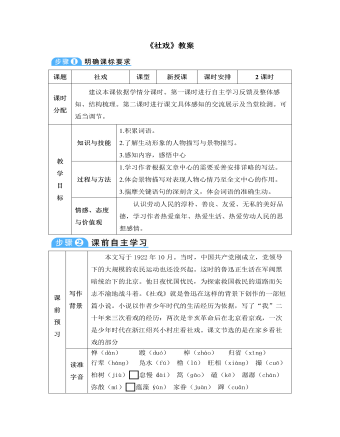
部编版语文八年级下册《社戏》教案
(3)烘托了人物怎样的心情?作者采用写意手法,从色彩、气味、声响等方面,描绘了夏夜行船、月夜归航等画面,充满了水乡特色,很好地烘托了“我”欢畅愉悦的心情,情景交融,令人难忘。【把握文章主旨】课文结尾说:“真的,一直到现在,我实在再没有吃到那夜似的好豆,——也不再看到那夜似的好戏了。”对这个结尾应该怎样理解?你在生活中有这样的体会吗?其实那夜的戏,看得叫人“打呵欠”“破口喃喃的骂”;那夜的豆,第二天吃起来也实在平常。所谓“那夜似的好豆”“那夜似的好戏”,代表了作者对天真烂漫、自由有趣的童年美好的回忆,充满一种浪漫的理想色彩,表现对人生理想境界的渴望和追求。第二问是开放性题目,同学们可根据自己的实际情况作答。